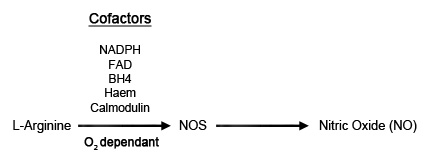Free Shipping - 48hrs Only | Use Code: FREESHIP
Ends 26/04 11:59PM AEST Min spend $79
Nitric oxide supplements have been quite the buzz for some years now, particularly in the bodybuilding community1. This is largely because an increase in nitric oxide levels is correlated with a better ‘pump’, among other things. For some time, the most popular ingredient associated with raising nitric oxide levels has been l-arginine. Sadly though, there is very little in the way of published research to indicate that oral supplementation with arginine (or any of its derivatives) actually increases nitric oxide levels1. This is the reason amino acids like citrulline have risen to prominence, as they have been shown to be more effective at raising blood arginine that arginine itself. The problem is that arginine is extensively metabolised by enzymes in the gut and also by the liver, leaving very little for passage directly into the blood stream1.
Nitric Oxide Synthesis From Arginine
Arginine has been the most popular amino acid for boosting nitric oxide simply because arginine is what the body uses to manufacture nitric oxide. This reaction is performed by a class of enzymes called nitric oxide synthase’s or NOS. A lesser known fact is that this family of enzymes requires a number of what are called, cofactors. Cofactors are often derivatives of vitamins or amino acids that help an enzyme function optimally. One analogy for cofactors could be lanes of a highway. Think of cofactors as additional lanes on a highway, which allow a mass of vehicles to get from A to B quicker. Without, the extra lanes, flow is restricted. In the same way, without the cofactors, often the reaction cannot proceed or is significantly impaired. So in the case of arginine, insufficient cofactors can limit the production of nitric oxide. For the science buffs, the diagram below shows the reaction catalysed by nitric oxide synthase and the relevant cofactors.

New Pathways for Nitric Oxide Generation
Until recently, production of nitric oxide was only thought to occur via synthesis from arginine, which as described above is a relatively complex chemical reaction. However, a number of years ago, a new, less complex pathway for nitric oxide synthesis was discovered. This reaction simply generates nitric oxide from dietary ‘nitrate’. Research has found that when dietary nitrate (NO3-) is ingested, it is quickly converted to a substance called nitrite (NO2-) by bacteria in the mouth. Nitrite is then subsequently converted to NO. Unlike the production of NO from arginine, the production of NO from nitrate does not require any cofactors and is also independent of oxygen, as shown below.

Dietary & Supplement Forms of Nitrate
The best known dietary source of nitrate is beetroot juice. In fact, a number of studies have been conducted to measure the performance enhancing effects of acute beetroot juice supplementation, with encouraging results2. Nitrate is normally ingested as part of a healthy diet3. Vegetables account for 60-80% of the daily nitrate intake in the average western diet4. Aside from beetroot juice, green leafy vegetables such as lettuce and spinach are also good sources of nitrate3. Nitrate can also be ingested in supplement form, with the most popular being sodium nitrate or NaNO32. Supplemental nitrate is rapidly absorbed from the gut and passes into the systemic circulation with peak blood levels occurring within approximately 60 minutes5, 6.
Ergogenic Effect of Nitrate
There have been over 10 studies examining the performance enhancing properties of nitrate supplementation, either as beetroot juice or sodium nitrate. All have invariably shown some measure of performance enhancement. However, all of the studies have involved tests of aerobic exercise capacity, using cycling or treadmill running protocols. As such, no studies have confirmed an increased ‘pump’ effect or increased muscle strength/force during a subsequent weight training session. However, the study of nitrate as an ergogenic aid is still in its infancy so it is reasonable to expect that future studies will emerge exploring the potential role of nitrate supplementation in strength training. Nonetheless, several sports nutrition companies have started to move away from the traditional arginine-based NO supplements to ones containing nitrates. Samples of these are listed on the right hand panel of this page.
Summary
In closing, supplemental nitrate appears to be a promising nutrient for increasing nitric oxide levels. Unlike arginine, nitrate’s ability to raise nitric oxide is well supported by scientific studies. Nitrate is the latest addition to the slowly growing list of credible alternative nitric oxide boosters, such as glycine propionyl-l-carnitine and citrulline.
1. Bloomer RJ. Nitric oxide supplements for sports. Strength and Conditioning Journal. 2010;32(2):14-20.
2. Bailey SJ, et al. The nitrate-nitrite-nitric oxide pathway: Its role in human exercise physiology. European Journal of Sport Science. 2012;12:4:309-320.
3. Bryan, NS & Hord, NG(2010a). Dietary nitrates and nitrites: The physiological context for potential health benefits. In N. S. Bryan (Ed.), Food, nutrition and the nitric oxide pathway (pp. 59-78). Pennsylvania: DEStech Publications.
4. Ysart G, et al. Dietary exposures to nitrate in the UK. Food Additives and Contaminants. 1999;16:521-532.
5. Lundberg JO & Weitzberg E. NO generation from inorganic nitrate and nitrite: Role in physiology, nutrition and therapeutics. Archives of Pharmacal Research.2009;32:1119-1126.
6. Lundberg JO & Weitzberg E. NO-synthase independent NO generation in mammals. Biochemical and Biophysical Research Communications.2010;396:39-45.
